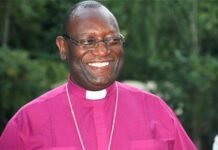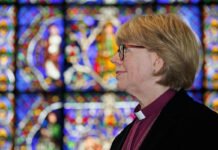
Authorities harassed about 60 followers of the Montagnard Evangelical Church of Christ as they prepared to celebrate Christmas in Phu Yen province on Vietnam’s south-central coast, confiscating a banner and beating the pastor, members of the church in Ea Lam village said.
The authorities have accused the church of wanting to overthrow the government. though church members deny the allegation.
Police first assaulted and detained Y Cuon Nie, the church’s pastor and a missionary, on Dec. 22 while he was at a printing shop to make the celebratory banners.
“When I was at Viet Long Printers to make a Christmas banner costing 240,000 dong [U.S. $11], they came, confiscated it, and hit me on my back. They took me to the headquarters of Tan Lap town’s police, saying it was not permitted,” he told RFA on Monday.
Authorities, who arrested Nie at 2:30 p.m. that day, did not release him until five hours later, he said.
On Christmas Eve, when Nie and church members were holding a Christmas ceremony in his home, police led by Lieutenant Colonel Dinh Ngoc Dan entered and demanded that they stop.
“At around 10 p.m. Lieutenant Colonel Dinh Ngoc Dan came to my place and said, ‘Stop it all! What are you doing? Who allowed you to do this?’” Nie said. “He shouted. He did not respect the host, and he noisily disrupted our ceremony.”
The police official threatened Nie and took him to the Song Hinh district station for questioning.
When contacted by RFA, the Song Hinh district police denied harassing the members of the church.
“You’d better contact the People’s Committee,” said an officer who did not give his name, referring to the provincial subordinate of the Communist Party of Vietnam.
“We police did not carry out any crackdown at all,” he said. “Not only in Song Hinh district but also in the whole country, our religious policy is very clear and favorable for religious practitioners. If they want to make complaints or petitions, they should write to the [relevant] agencies.”
RFA contacted To Van Giang, chief of staff of Song Hinh district’s Fatherland Front Committee, an umbrella group of mass movements in Vietnam aligned with the country’s Communist Party, but he said he was busy with a meeting. He could not be reached again later in the day.
Vietnam’s constitution mandates protection for religious freedom and states that citizens can follow any religion or none. But it also permits authorities to override rights including religious freedom for purposes of national security, social order, social morality and community well-being.
The country’s Law on Belief and Religion, which went into effect in early 2018, requires religious communities to formally register their organizations and places of worship, though only organizations that have operated for at least five years can apply for registration. Once registered, the organizations are granted status as legal entities.
Nie said that his religious group tried to meet the requirements for registering under the law, but that he had not received any responses from authorities during the past few years.
In the meantime, police had pressured church members to renounce their religion, he said.
RFA reported in January that local authorities from the Ea Lam commune and Song Hinh district forced members of the church to publicly denounce their faith in front of other villagers.
A Dao, a former pastor of the Montagnard Evangelical Church of Christ, was arrested in August 2016 when returning from a conference on East Timorese religious freedom. He was tried and sentenced to five years in prison in neighboring Gia Lai province for helping individuals to escape abroad illegally. In September 2020, he was released to exile in the United States after serving nearly four years in prison.
“Authorities continued to actively persecute independent religious minority communities, including Protestant Hmong and Montagnard Christians, Hoa Hao Buddhists, the Unified Buddhists, Cao Dai followers, Catholics, and Falun Gong practitioners,” said the U.S. Commission on International Religious Freedom about Vietnam in its annual report issued in April.
“Ethnic minority communities faced especially egregious persecution for the peaceful practice of their faith, including physical assault, banishment, detention, imprisonment, and forced renunciation of faith,” the report said.
By the end of 2020, the Vietnamese government officially recognized 16 religions and 43 religious organizations, although many groups refused to register out of fear of persecution or concern for their independence, the commission said.


